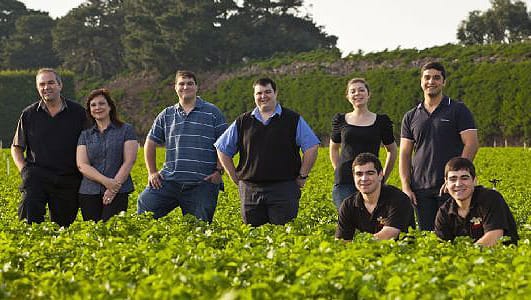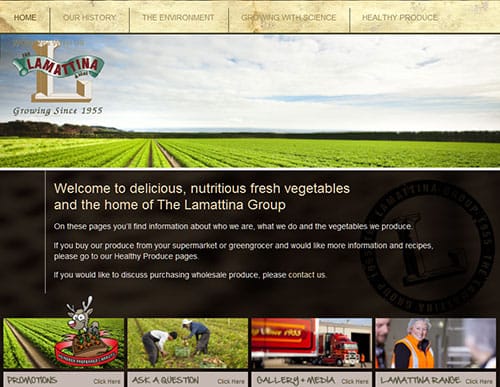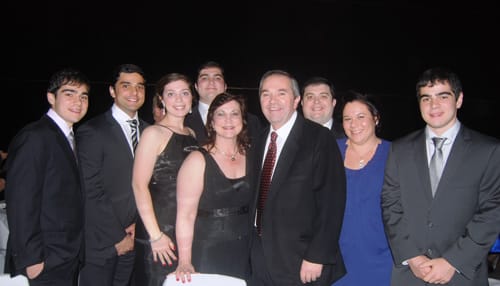|
|
Tina Lamattina was once an aspiring medical student – now she is ensuring Australians have access to healthy fresh food, and lots of it. Tina and her husband, Russell, are continuing the family tradition of growing vegetables, but on a scale far greater than that contemplated by Russell’s parents, Angelo and Giuseppina, when they began working 0.8ha with a horse and plough in 1955. “Russell’s parents started the business here in Australia,” Tina said. “His grandparents and great grandparents were farmers back in Italy. “They’ve been on the land for generations. “In Australia we’re the second generation and our children the third.” Tina was studying to be a doctor when she met Russell. Her first job on the farm after their marriage in 1983 was washing and packing carrots “as most wives do”.
As time went on and the farm and family grew – the couple have five sons and a daughter aged between 18 and 27 – Tina found it more difficult to continue working in the packing shed. She put up her hand to take over the administration and, recognising her lack of accounting or business experience, completed a TAFE course. Tina now oversees the administrative, accounting, quality assurance and environmental programs for the business, which occupies 400ha on the Mornington Peninsula and 3200ha at Happy Valley, on the banks of the Murray River, west of Robinvale. The Happy Valley property, managed by eldest son Angelo, was bought in 1993 to enable the Lamattinas to grow carrots year-round and broccoli in autumn and winter. Tina said they had deliberately chosen to grow a range of standard vegetables: broccoli, cabbage, carrots, celery, parsnips, silverbeet, iceberg lettuce and cos lettuce. “The lines we grow we consider to be fairly stable, they’re not as susceptible to the whims of the consumer,” she said. “Sometimes with lines that are a bit more ‘trendy’, they can be more expensive and, if a family has a limited amount of money to spend on fruit and vegetables, they’re going to go back to the basics – things they can afford, that are still nutritious and delicious. “It’s been part of our success, sticking with the basics.” The Lamattinas sell only whole vegetables on the domestic market through the central wholesale markets and major supermarkets. Last year, they produced 45,000 tonnes of carrots, 15,000 tonnes of iceberg lettuce, 10,000 tonnes of celery, 15,000 tonnes of parsnips, 4000 tonnes each of cabbage and broccoli, 2000 tonnes of silverbeet and 6000 tonnes of cos lettuce.
As one of Australia’s biggest parsnip producers, the Lamattinas have used their own seed for the past 50 years. They select the best parsnips, replant them, grow and harvest the seed, treat and store it, then use it to grow the next year’s crop. “It’s been very beneficial to us because over the years we’ve managed to develop the parsnip into the type of product the consumer wants and we’ve done that in a natural way, through natural selection,” Tina said. “Parsnips really are very popular. “Traditionally they’re probably an older person’s vegetable, but you’d be surprised by the number of younger people who buy them and enjoy them.” Tina is one of the few growers who doesn’t bemoan the increasing workload from paperwork and record keeping. “Accountability is not a bad thing,” she said. “It separates the people in the industry who are a bit more professional from those who put seeds in the ground and hope for the best”. “We don’t treat our business that way, we relate to it in a very corporate way. We have family board meetings and have developed a family constitution.” “It’s important if you’re going to stay viable in this game you really need to treat it as a professional business.” The oldest two sons, Angelo and Dominic, are already working in the business and the youngest, 18-year-old twins Robert and Anthony are keen to work on the farm after they finish high school. Russell Jr is in his second year of a Bachelor of Agricultural Science at La Trobe University and Josephine, who has been studying food science and nutrition, intends to complete a masters in genetics because of her passion for functional and genetically modified foods. As well as her other roles, Tina takes a particular interest in marketing and public awareness to increase fruit and vegetable consumption. She said television cooking shows such as Masterchef had helped get people back into the kitchen and back to basic food, but further public education was needed. Education also would play a key role in the future emergence of new genetically modified vegetable varieties. “We all see a future in this industry using GM eventually,” she said. “It will be a matter of working with the scientists to work out how best to approach it.” Tina said she looked forward to the day her family could grow higher-yielding, nutritious crops with the use of fewer chemicals, which would in turn have a reduced impact on the environment. “Science is at the doorstep, but it has a long way to go before it can be tested and accepted,” she said. “As time goes on it will become more readily accepted because people will understand it better.” Tina was presented with the Women in Horticulture Award at the third annual AusVeg convention and awards dinner in Hobart.
AusVeg chairman John Brent said the award recognised Tina’s success in handling the administrative, accounting, quality assurance and environmental aspects of the Lamattina group, which produces up to 100,000 tonnes of fresh produce each year. Tina said she knew she was one of the 10 finalists in the awards, but still doesn’t know who nominated her. “I was taken aback,” she said. “It was not something I expected. “I was among women from all over the country who probably do very similar to what I do, if not more, and so I felt quite privileged and quite honoured.” Source: Sandra Godwin – Weekly Times, 6 Jun 2012 |
|


